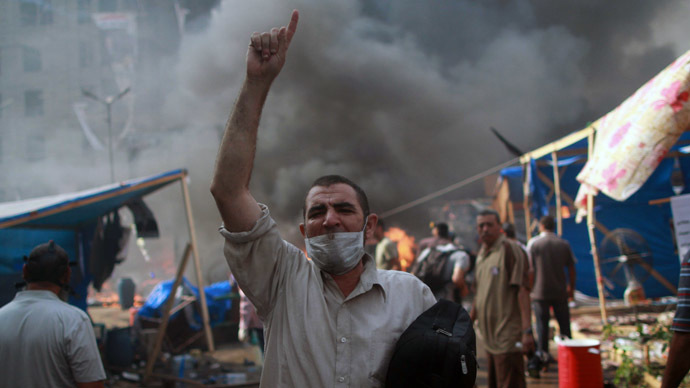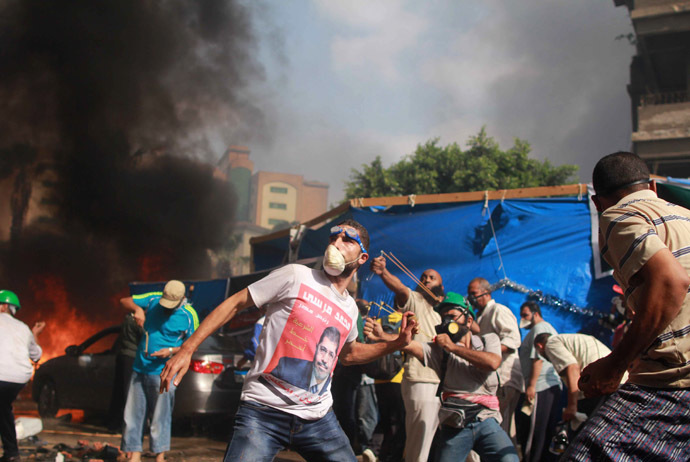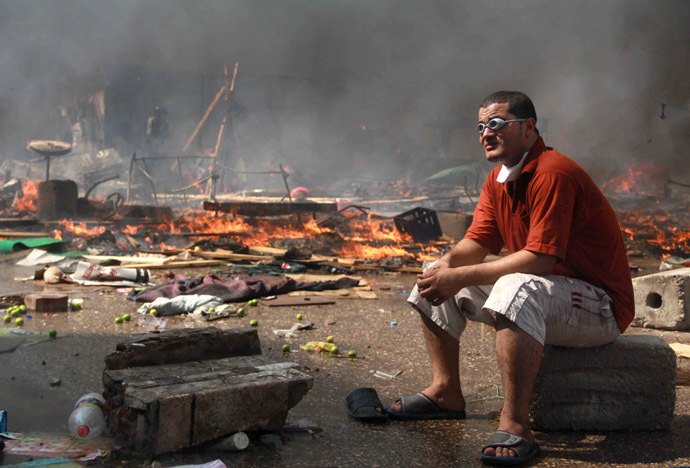Violence no tool to solve Egyptian divide

The situation in Egypt is desperate as the army’s plan to return to Mubarak era is likely to fail due to political Islam firmly striking roots in the country in recent years, journalist and author, Hugh Miles, told RT.
A vigorous police crackdown on the sit-ins supporting Egypt's
ousted Islamist president Mohammed Morsi has turned Cairo into a
battlefield.
Health and security officials are so far only talking of dozens
of confirmed casualties, although the Muslim Brotherhood claims
more than 500 have been killed.
Hugh Miles says that the new wave of violence in the Egyptian
capital comes as no surprise, with the army issuing warnings to
the pro-Morsi protesters beforehand.
“Well, the military have been preparing for this for some
time, there have been leaks about this for several days. We were
expecting it right after the Eid holiday, which was a couple of
days ago. But I think the square was just too full of people then
for it to be safe and they thought that maybe they could frighten
some people off by leaking about the attacks in advance."
The journalist believes “anything is possible” in Egypt, which is
equally split between the backers of civil society and the
Islamists.
“Egypt is obviously sliding into a very desperate condition.
The future is highly uncertain and all the predictions so far
about what’s going to happen in Egypt have all turned out to be
wrong. So, it’s very difficult to say what’s going to happen.
Various historical precedents, the Algerian model, the Syrian
model, the Iranian model – none of them particularly
attractive," Miles told RT.
Getting back to the Mubarak era is dreaming
Egypt is a very divided society, and the Islamists are very popular, having won the last four democratic elections, so they can`t just be swept under the table, Miles believes. He says it's not possible to turn the clock back to the Mubarak era, which seems to be the plan at the moment for General [Abdel Fattah] el-Sisi and his backers.
"If that’s their plan, to try and go back to the kind of
status quo before 2011 revolution, they are dreaming because
Islamists in Egypt are now used to being free and being able to
practice their religion in the way they want. And it’s not going
to be easy to deny these people, what they have become accustomed
to.”

By relying on methods of force, the military has shown that it
doesn’t have the clear view of what’s happening in the Egyptian
society where the influence of Islam has recently increased,
Miles explained.
“Well, the Egyptian people are very divided and not all behind
this move at all. I mean this a move which is being orchestrated,
as far as we can tell by General Sisi and the army. And, of
course, the army have spent decades ruling Egypt and have long
been opposed to the Muslim Brotherhood. And they’re very separate
from the Muslim Brotherhood. The army tries to keep the Muslim
Brotherhood out of the ranks. So, the army and the security
services generally in Egypt are very used to dealing with these
enemies. This is a kind of back to the old school. It`s back to
the old rule book in Nasser’s time or Mubarak`s time. The
Islamists are a threat to the state and they can be locked up,
repressed, shut down. And that’s what we’re seeing now."
But times have changed since this tactics worked, and it seems
that the military is out of touch with the make-up of Egyptian
society today where Islamism has become extremely popular, Miles
says.
"What we’re really seeing now in Egypt is a clash between
people who want Islam as their frame of reference against people
who want a more secular kind of European style frame of
reference. And that’s a very fundamental divide. It divides
families and it divides Egypt. Probably, roughly half and half is
the best guess.”
Army is not used to Islamists' popularity
According to the journalist, the only way out of the crisis for
the split society in Egypt is compromise, but no sides seem eager
to make concessions.
“Egypt has to find a way of squaring this circle. And an
obvious way is to have some kind of political reconciliation:
some kind of power sharing government, where, for example,
president Morsi is allowed back, but he has no other Muslim
Brotherhood ministers and Mohamed El-Baradei is a deputy and
maybe Hamdeen Sabahi can run this ministry and Amr Moussa can run
another ministry. So, everyone shares power like as happened in
South Africa after the end of the Apartheid."
But there has been no indication of any kind of broad inclusive
reconciliatory gesture, Miles says. "The army and its
supporters seem to think that they can go this alone without
having any Islamists counting on into the power sharing at
all."
"And certainly the army has got powerful backers, they have
got allies, there are many people who support them and would like
very much to turn the clock back to the Mubarak era because this
model suited many other countries in the region: Egypt was
predictable, it was manageable, yes, it had problems but it was
easy to deal with. And the alternative, which is an Islamist
style government, is a huge unknown quantity, which frightens
just about every country in the region and many countries in the
West,” Miles concluded.
'Muslim Brotherhood wanted to destabilize Cairo'
Egyptian political activist, Ebtesam Madbouly, disagrees with
Miles‘s claim of a fifty-fifty split in the Egyptian society,
saying that the Morsi supporters are in minority in the country,
despite him claiming over half of the votes in last year’s
election.

“Let me tell you this: its 50 percent of the people, who went
to the election, there are lots and lots of people who didn’t go.
And let me tell you: on the night of the June 30, there were 30
million people on the street. The night of the June 26 there were
40 million people on the street. People who elected Morsi were
not only pro-Morsi people, there also were lots and lots of
people who were just against the Mubarak regime.”
Her words were echoed by political sociologist, Dr. Said Sadek of
American University in Cairo, who stressed that every month
public opinion polls, locally and internationally, showed a
decline in the popularity of President Morsi.
“People elected him only on one platform, that he would achieve
the objectives of the Egyptian revolution, not the objectives of
his own organization. This is what he really did. He began to use
his office to put his own people, to turn Egypt into a semi
totalitarian state. He began to a play a political game. He used
democracy as a ladder to reach power.”
The current turn of events in Cairo was provoked by the Muslim
Brotherhood members, who refused to restore order in the city,
Sadek added.
“The strategy of the Muslim Brotherhood was to control and
destabilize Cairo by controlling the traffic, by controlling some
districts and even try to expand them. They also tried to use
flash-mobs to besiege some ministries, like yesterday they tried
to besiege seven ministries and cause chaos, troubling traffic of
Cairo. The Egyptian government after taking all the mandates
waited enough, they started acting and the brought foreign media;
they brought human rights organizations to see how things are
being done.”

Meanwhile, the Muslim Brotherhood spokeswoman in the UK, Mona Al
Qazzaz, told RT that the actions of the military are only
increasing the divide in the Egyptian society.
“They (the army) didn’t show even a single sign of good will
gestures. They didn’t show any step towards reconciliation. What
they’re doing is actually making the polarization within Egypt
even deeper. We hold General Sisi, the military junta and all the
Egyptian authorities and the civilian façade responsible for
every single Egyptian blood that is shed.”
She also said that it’s “the silence of the international
community,” which has given the military a mandate to use
force against the “largely peaceful” pro-Morsi
protesters.
“Our protests have been there for 46 days – they have been
largely peaceful. Obviously, the protests aren’t a centralized
protest. We have no control of what is happening in the other
cities. What erupted today in every single province of Egypt was
a spontaneous outrage of the Egyptian people, who saw the
massacre on Egyptian TV and could do nothing, but go to the
streets and say: this is enough, it’s enough for the military
rule, it’s enough for this military junta we’re getting back our
free Egypt.”
An assistant professor of The American University in Cairo,
Mohamed Elmasry, also put the blame for the violence on the
interim government, which “instigated a military coup and then
proceeded to carry out mass repression” in Egypt.
“Any time you deviate from democratic norms, usually, it
spells disaster. In Egypt we had a democratic society in place.
The opposition could’ve competed in elections; could’ve competed
for parliamentary seats. We had regular elections scheduled. We
had term limits. We had balance of powers – the prime minister
was about as powerful as the president. I could go on: the right
to form political parties for anyone; the right to establish a
newspaper without permission from the government.
"Now, all of that has been abandoned. And we’re living
essentially in a military state and some of the people, who
supported this coup continue to state that their optimistic about
the future. Although, frankly, I don’t understand how people
based on the reality that we’re seeing on the ground in terms of
the violence and also in terms of the policies.”
The statements, views and opinions expressed in this column are solely those of the author and do not necessarily represent those of RT.












